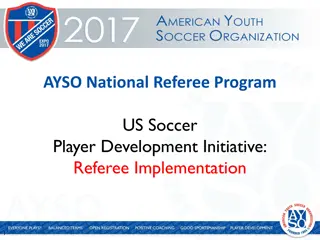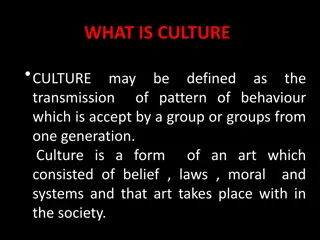Evolution of Sports Movies: From Player Heroes to Managerial Focus
Explore the shift in sports movies from focusing on underdog players to portraying managers and owners as heroes. Discover how capitalism has influenced the narrative in sports films, with a rise in storytelling around strategy, vision, and hard work. Dive into the world of fantasy sports and leagues that connect fans with the entrepreneurial aspect of sports. Delve into the impact of ESPN's transition to producing documentaries as a key part of their media empire.
Download Presentation

Please find below an Image/Link to download the presentation.
The content on the website is provided AS IS for your information and personal use only. It may not be sold, licensed, or shared on other websites without obtaining consent from the author. Download presentation by click this link. If you encounter any issues during the download, it is possible that the publisher has removed the file from their server.
E N D
Presentation Transcript
Sports and Film Jessica Manfredi & Muhammed Alli COMM412
How Capitalism Took Over Sports Movies By: Mike Miley For a while most sports movies were "repetitive" in a sense with their storylines: an athlete or team that's never gotten a fair chance/ has been an underdog is victorious and earns respect from rivals (Ex: Hoosiers, Seabiscuit, The Mighty Ducks, Remember the Titans, Rocky, etc. ) Films such as these ones have become classics and noble because of the similar heartfelt storylines of dark horses rising to the top. Recent movies like Creed and Race have followed that same pattern, but over the few years there's been a new kind of narrative for sports movies We see in movies like Moneyball, Draft Day and in T.V. series' like The Ballers and The Agent, the focal point is now on managers and owners as "heroes", instead of players. No longer about talent and ability ; shifted to strategy, vision, and hard work
How Capitalism Took Over Sports Movies... Fantasy sports and leagues allows fans to connect more with sports and these owners/general managers and feel in position like them. According to the Fantasy Sports Trade Assoc., 500,000 people played fantasy sports in the US/ Canada in 1988, but by 2003, that number jumped to 15.2 million - then in 2006, after congress passed a law stating that it was legal to bet on games of skill (fantasy sports) the industry grew even more rapidly in 2015 to 56.8 million people Moneyball Adapt or Die : https://www.youtube.com/watch?v=ugN5aD5p2NU Is this style of movie more successful as whole? - More for older audience with entrepreneurial aspect Creed was successful for past and present combined style reasons, but rooted in the game itself: rare contemporary film that finds a midpoint between the narratives of the all-powerful general managers and the traditional stories of team-centric success.
Past vs. Present Style of Sports Films Moneyball Clip: https://www.youtube.com/watch?v=LaO8L5aSyQo Gridiron Gang: https://www.youtube.com/watch?v=6QvQw_XBo8k
ESPN: the Making of a Sports Media Empire By: Travis Vogan ESPN25 vs. ESPN 30 for 30 Once ESPN partnered with Tribeca, ESPN switched to producing a new genre of films: documentaries ESPN Films acquired independent films, before producing large number of their own documentaries Their documentaries were also significantly cheaper to produce than live coverage, scripted movies, etc. They made the documentary the main topic rather than other distractions
ESPN: the Making of a Sports Media Empire By: Travis Vogan 30 for 30 had a different filmmaker for each episode, let the filmmaker decide the topic, and did not always focus on the most popular story ESPN wanted to be #1 in sports documentaries, instead of HBO Nine for IX focused on women s stories, and their fight for gender equality The Decision (film about Lebron James decision to leave Cleveland) became one of ESPN s most shameful moments
The Best Baseball Movie Ever? Bull Durham By: Allen Barra Ron Shelton changed the way Hollywood produced sports films Bull Durham was his production and it encompassed the heart and mind of baseball; the movie was an instant success The movie was about life in baseball s minor leagues Critics questioned the movies credibility because of what was being talked about during games However, sports movies always revolved around a Big Game , but for most athletes that is not all that matters to them Believes in a defining moment , and having a relatable character/story
Rocky, Ali and beyond: Boxing has a rich history in the movies By: Dave Lewis The sport of boxing has had an extreme amount of success in movies, with different types of them displayed. Boxing movie success dates back to 1930 s Muhammad Ali's reign as being the "Greatest of All Time" inspired a new movement for boxing in the '70's which was felt in the award-winning classic "Rocky" Boxing Movie Hall of Fame: "Champion", 1949 (Kirk Douglas), "Raging Bull", 1980 (Robert De Niro), "Million Dollar Baby", 2004 (Hilary Swank),"The Hurricane", 1999 (Denzel Washington), "Ali", 2001 (Will Smith)
Case Study Clip http://www.mercurynews.com/2016/09/29/richard-sherman-players-dont- have-a-reason-to-trust-nfl/ Ratings sell , players get extremely injured, but does the NFL care? Players are reduced to numbers, statistics, revenue, etc. We can relate this to Moneyball, the focus becomes the statistics, what a player is worth, and what kind of revenue a player can produce for a team The focus is on the GM/owners and the league, and there is less consideration for the players, much like how sports films are focusing on these same things, instead of the players

















































